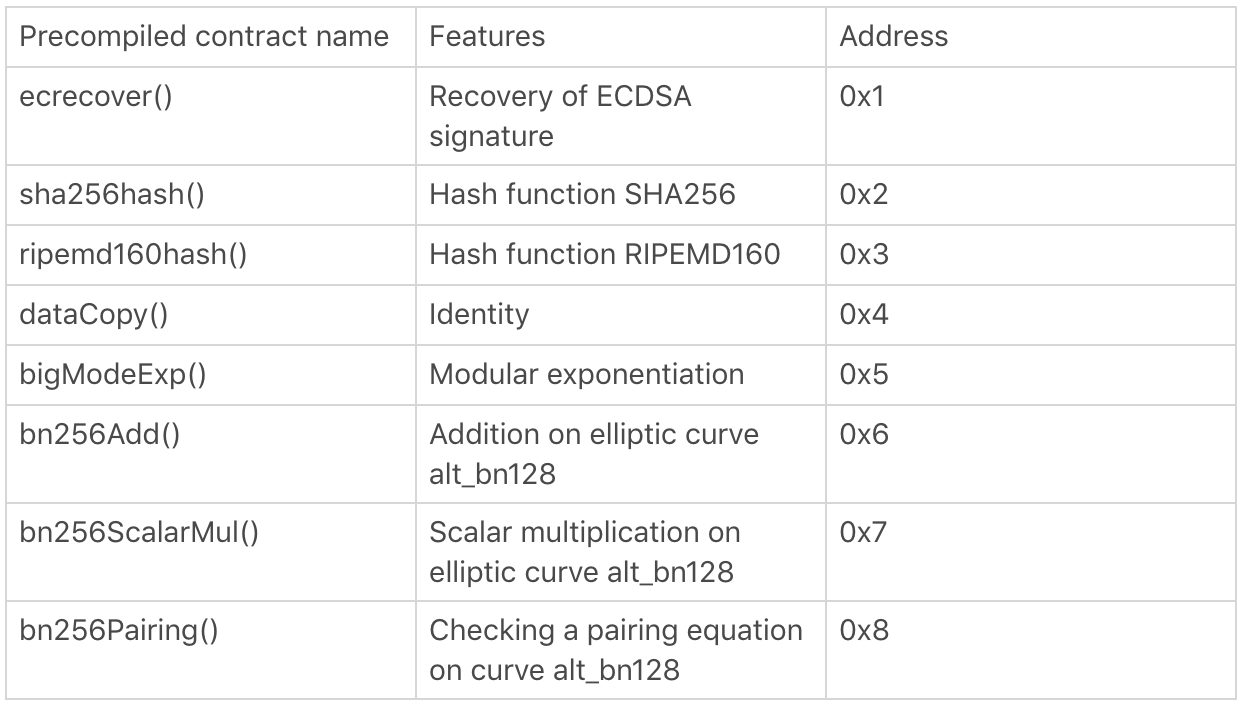以太坊预编译合约
- Ashton
- 发布于 2019-10-14 19:03
- 阅读 12594
以太坊预编译合约
由于 EVM 是一个基于堆栈的虚拟机,它根据交易所要执行的操作指令内容来计算 gas 消耗,如果计算非常复杂,在 EVM 中执行相关操作指令就会非常低效,而且会消耗大量的 gas。 例如,在 zk-snark 中,需要对椭圆曲线进行加减运算和配对运算。 在 EVM 中执行这些操作是非常复杂和不现实的。所幸以太坊还支持预编译合约。
预编译合约是 EVM 中用于提供更复杂库函数(通常用于加密、散列等复杂操作)的一种折衷方法,这些函数不适合编写操作码。 它们适用于简单但经常调用的合约,或逻辑上固定但计算量很大的合约。 预编译合约是在使用节点客户端代码实现的,因为它们不需要 EVM,所以运行速度很快。 与使用直接在 EVM 中运行的函数相比,它对开发人员来说成本也更低。
在以太坊中已经实现了不少预编译合约了,比如下面这些:

预编译合约
在代码层面,所谓的地址实际上是合约数组的索引,每一个索引唯一对应一个预编一个合约。
在 EVM.go 文件中,调用智能合约有4个函数: Call ()、 CallCode ()、 DelegateCall ()、 StaticCall ()。 这四个函数所做的工作是生成合约对象,但是诸如参数之类的具体细节会有一些差异。 在合约实例化之后,将调用 evm.go 中的 run 函数来运行智能合约。 该函数考虑了预编译合同和非预编译合同调用的情况。 在下面的代码中,第一个分支是通过指定预编译索引来实例化参数 p,以指定预编译合约。 这里数组的索引实际上对应于声明预编译的合同数组时地址的概念。 然后调用 RunPrecompiledContract 函数来执行预编译合约。 如果它是一个未预编译的合约,则 EVM 的解释器会被调用。
// run runs the given contract and takes care of running precompiles with a fallback to the byte code interpreter.
func run(evm *EVM, contract *Contract, input []byte, readOnly bool) ([]byte, error) {
if contract.CodeAddr != nil {
precompiles := PrecompiledContractsHomestead
if evm.ChainConfig().IsByzantium(evm.BlockNumber) {
precompiles = PrecompiledContractsByzantium
}
if p := precompiles[*contract.CodeAddr]; p != nil {
return RunPrecompiledContract(p, input, contract)
}
}
for _, interpreter := range evm.interpreters {
if interpreter.CanRun(contract.Code) {
if evm.interpreter != interpreter {
// Ensure that the interpreter pointer is set back
// to its current value upon return.
defer func(i Interpreter) {
evm.interpreter = i
}(evm.interpreter)
evm.interpreter = interpreter
}
return interpreter.Run(contract, input, readOnly)
}
}
return nil, ErrNoCompatibleInterpreter
}
在 RunPrecompiledContract 函数中,可以看到 p 变量实现了 bn256曲线加法操作,然后返回结果。 可以清楚地看到,这部分操作是在客户端执行期间计算出来的。
// RunPrecompiledContract runs and evaluates the output of a precompiled contract.
func RunPrecompiledContract(p PrecompiledContract, input []byte, contract *Contract) (ret []byte, err error) {
gas := p.RequiredGas(input)
if contract.UseGas(gas) {
return p.Run(input)
}
return nil, ErrOutOfGas
}
// bn256Add implements a native elliptic curve point addition.
type bn256Add struct{}
// RequiredGas returns the gas required to execute the pre-compiled contract.
func (c *bn256Add) RequiredGas(input []byte) uint64 {
return params.Bn256AddGas
}
func (c *bn256Add) Run(input []byte) ([]byte, error) {
x, err := newCurvePoint(getData(input, 0, 64))
if err != nil {
return nil, err
}
y, err := newCurvePoint(getData(input, 64, 64))
if err != nil {
return nil, err
}
res := new(bn256.G1)
res.Add(x, y)
return res.Marshal(), nil
在智能合约代码中,可以像普通合约一样在合约文件中直接调用预编译合约,但调用方式有所不同。 我们可以在汇编代码块中对预编译合约进行调用。
assembly {
if iszero(call(gasLimit, contractAddress, value, input, inputLength, output, outputLength)) {
revert(0, 0)
}
}
- 从 EVM 到 SVM:资深安全研究员给出的 2026 安全指南 159 浏览
- Solidity 设计思考:区分汇编和 Solidity 是个错误,不要在 Solidity Core 中重蹈覆辙! 444 浏览
- EVM 开发者在 Sui 上构建应用的心理模型 - 第二部分 448 浏览
- 代理安全检查清单:33项关键可升级性检查 239 浏览
- EVM Gas 分析:新的执行跟踪数据 351 浏览
- EVM开发者在Sui上构建的心智模型 - 第一部分 356 浏览
- Vitalik的L2重置:以太坊为何需要此航向修正 339 浏览
- 以太坊速度工程:我们如何使 Ethrex 提速 20 倍 366 浏览
- REVM源码阅读-Context 406 浏览
- 智能合约代理模式:2026 年安全指南 514 浏览
- Ethrex L2:构建 Rollup 的一种不同方法 410 浏览
- REVM源码阅读-Frame(1) 582 浏览

